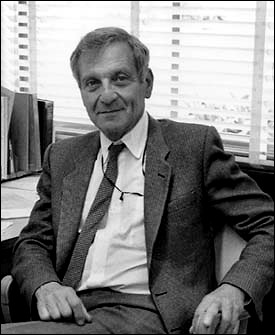

|

|
IN MEMORIAM
Burton Benedict
Professor of Anthropology, Emeritus
UC Berkeley
1923–2010
Over the course of a diverse and international career, Burton Benedict made important contributions to the fields of social structure, economic and applied anthropology, and the anthropology of museums, expositions, and zoos.
Born on May 20, 1923 in Baltimore, Maryland, Burton Benedict was raised in Baltimore, New York, and Hollywood. He attended Harvard University, intending to study his child-hood passion of ornithology, but left upon the outbreak of World War II. Benedict’s service in the U.S. Army Air Force took him to New Mexico, where his encounters with the local Pueblo Indians stimulated an interest in anthropology. Returning to Harvard, Benedict studied with Gregory Bateson and Florence Kluckhohn in the innovative interdisciplinary Department of Social Relations. In 1949, he earned his A.B. degree in anthropology, with an honors thesis on the adjustment problems of second generation Chinese in Boston.
A self-described “terrific Anglophile,” Benedict decided to enroll in the London School of Economics, where he studied social anthropology with Raymond Firth, Maurice Freedman, and Edmund Leach. His 1954 doctoral thesis was devoted to Muslim and Buddhist associations in London. He then spent a year as a senior research fellow at the Institute of Islamic Studies at McGill University in Montreal, compiling an annotated bibliography on the sociology of Muslim peoples (1955).
Burton Benedict was noted for his extensive fieldwork on the islands of Mauritius (1955–57) and the Seychelles (1960, 1974–75). With funding from the Colonial Social Science Research Council, during his first trip he focused on the Indian community in Mauritius. In addition to fieldwork for his bachelor’s (1948) and doctoral dissertation (1952–54), he also did research in Malawi in 1962.
This ethnographic research was embodied in several monographs: Mauritius: The Problems of a Plural Society (1965) and People of the Seychelles (1966; second edition, 1968; third edition, 1970). In 1982 he published an innovative experiment in ethnographic writing: Men, Women and Money in Seychelles: Two Views, co-authored with his wife, Marion. Benedict’s research interest in economic anthropology and currency led to his curation in 1991 of an exhibit on money.
In 1958, Benedict returned to teach at the London School of Economics. After a decade at LSE, Benedict joined UC Berkeley’s anthropology faculty, first as a visiting professor in 1966–67, and as professor the following year. Given his research with overseas Indians, he contributed to the burgeoning Berkeley program in South Asian Studies. Along with Elizabeth Colson and William Shack, Benedict was active in fostering an interest in British social anthropology within the Berkeley department. He also pioneered in developing a writing seminar for anthropology graduate students. In addition to his teaching, Burton Benedict held a number of important and influential administrative positions: chair of the Department of Anthropology (1970–71), the first dean of the social sciences division in the College of Letters and Science (1971–74), and membership on the Committee on Budget and Interdepartmental Relations, more commonly known as the Budget Committee (1978–81, chairman, 1980–81).
An avid collector since childhood, Burton Benedict began a formal association with anthropology museums toward the end of his academic career. From 1984 until 1986, he was associate director of the Phoebe A. Hearst Museum of Anthropology, known at the time as the Robert H. Lowie Museum of Anthropology. Appointed acting director in 1988, he served as director from 1989 to 1994.
As a museum anthropologist, Benedict was not so much a scholar of material culture as he was a student and champion of museums as social institutions and as venues for public education. Benedict’s tenure as museum director was significant for the donation of a major endowment gift from the Hearst Foundations to help conserve the collections donated by Phoebe Hearst, for the renaming of the museum in 1991 after the institution’s founder, and for establishing a development office and membership program.
Burton Benedict was a long-time scholar of international expositions, as well as a collector of fair memorabilia. This passion led to his acclaimed 1982 exhibit at the Hearst [then Lowie] Museum devoted to the 1915 San Francisco Panama Pacific International Exhibition. He shared this scholarship in his innovative 1983 book, The Anthropology of World’s Fairs: San Francisco’s Panama Pacific International Exposition of 1915.
Another related interest was film. As the son of a Hollywood producer and publicist and a student of Gregory Bateson, Benedict was an early advocate for the use of film in anthropology, an interest that he broadened at the Royal Anthropological Institute during the late 1950s and continued during his years at Berkeley. In addition to his own field research footage, in 1984 he wrote, narrated, and produced an award-winning documentary film devoted to the Panama-Pacific exposition.
In 1991, the year in which he retired from active teaching, Benedict received the Berkeley Citation, the campus’s top honor. After retiring from UC Berkeley in 1994, he was active as a volunteer docent at the Hearst Museum and a trustee of the Oakland Zoo. He also taught a course on the anthropology of museums for the Osher Lifelong Learning Institute, a division of UC Berkeley Extension, in 2004.
Burton Benedict died of heart failure at his Berkeley home on September 19, 2010. He is survived by Marion Steuber Benedict, whom he married in 1950; and his two daughters: Helen Benedict, a professor of journalism at Columbia University, who lives in New York City; and Barbara Benedict, a professor of literature at Trinity College, living in West Hartford, Connecticut.
Further information about Burton Benedict may be found in his 2002 oral history (http://texts.cdlib.org/view?docId=kt3000043s&query=anthro&brand=calisphere) and at his entry for the UC Berkeley Anthropology Emeritus Lecture Series (http://www.lib.berkeley.edu/ANTH/emeritus/benedict/index.html).
Terence Deacon
Ira Jacknis
Mari Lyn Salvador